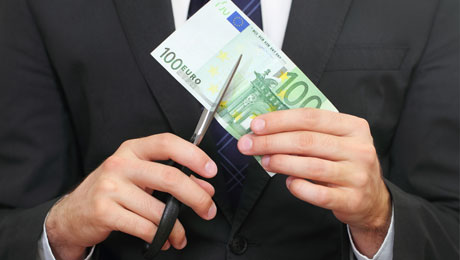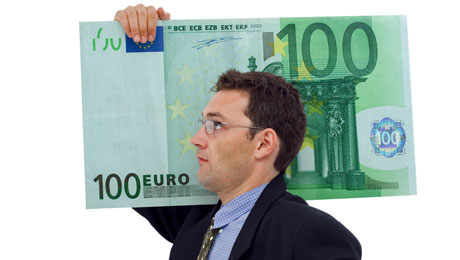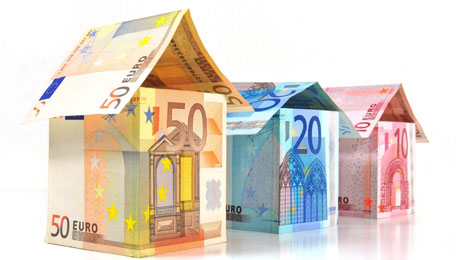Picture: www.clickatlife.gr
Increases in our incomes during this period are out of the question. Instead, the opposite can happen. Nowadays, we have to be inventive, creative and economical in order to be able to cope with difficult times.
But how can we do this with a basic salary which is constantly decreasing? Here are some ideas:
1. Cigarettes – the greatest desire
If you are one of those people who smoke and cannot stop, you need to make more efforts in order to save money. An alternative (before you stop smoking) is to choose natural tobacco, which is cheaper and does not contain as many chemicals as the commercial one. Think about it - you spend about 12 euro per week on tobacco (three cigarettes per day are about 18 g tobacco), which means that you spend about 50 euro per month - filters and paper included. If you still prefer ready-made cigarettes, you will have to reconsider it.

2. Coffee’s sinful company
Coffee is a typical habit that the Greeks will not abandon. On the other hand, spending even 1.5 euro per day on coffee in the office on average is a lot of money for one week alone (7.5 euro for a five-day working week). Therefore, the time has come to start making your own coffee. For example, a package of instant coffee costs an average of 5-6 euro (about 200 grams), which means that if you make it yourself, you can drink coffee worth the same amount for a few working weeks. If your finances are in very bad condition, you can have tea. Replace coffee in the office with a thermos of tea and you will feel the effect on your pocket.

3. Reading news on the Internet
One of the greatest benefits from new information technologies is the Internet. Just a click and we can learn about all the events and news from around the world. If you want to learn something about cinema, theatre, music, health, you can always visit www.clickatlife.gr. Absolutely free!

4. Food – the greatest enemy of our pocket
Supermarkets cause major damage to our weekly budget. The solution is to simply follow these steps: 1. Do not go shopping when you're hungry. You will spend at least 30 euro extra on food - sausages, chocolate and the like. 2. Never take your kids with you. Is it possible that they will not want everything? And since you cannot resist, you will spend at least 5 euro on junk. 3. You should always follow your shopping list. Thus, you will avoid buying things upon impulse. 4. Buy seasonal fruits and vegetables. They are cheaper, fresh and economical. Home deliveries are out of the question. In order to make sure that you will not call to order food as soon as you return tired from work, just throw away all the menus you have at home.

5. Forget about meat
Instead of filling the freezer with meat, you may sometimes choose its cheaper alternative - legumes, which, combined with cereals, provide you with a high dose of protein. Legumes are rich in fibre, and combined with rice they will give you the necessary nutrients. Therefore, forget about meat for a while – this will reduce your costs at the supermarket by an average of 5 euro per week.

6. Credit Cards? No!
If you remember the golden times when everyone had 5 or 6 credit cards (just for fun), the time has come to return to the present day. It is best to lock these away in the closet of history, next to your vinyl records. If you are one of those people who are still paying for the prodigality of old days, leave your credit cards at home in order to avoid temptations. Try to pay for them using the method of lifelong patience. If you are one of those people who are lucky enough to have got rid of plastic money – cancel your cards while you still can.

7. Advantageous offers by mobile operators – seize these
Mobile phone companies want you to be their next customer. Experience is a good thing, but since we are living in the era of the free market and competition, you should use their offers in the best possible way.

8. Brands, brands, brands
For those who remember the '90s, it is hard to imagine people who do NOT wear designer clothes made by some of the thousands of companies on the market. At the time, fashion became an institution and the younger generations learned to dress from head to toe according to the newest trends in fashion. Not anymore. Expensive clothes, shoes, accessories are nice, but in times of crisis we have to be judicious.

9. Coupons and offers, best friends forever
The time has come to embrace the popularity of bargains and coupons. It was once considered humiliating to use these, but today, they are ... art. Use all the economical offers provided by stores, especially supermarkets.

10. The car - well, not every day
In 2004, you needed 32 euro to fill up a car of small cubic capacity (1,100 cc) with petrol. On 25 March, you needed at least 50 euro and the petrol tank was still not full. You don’t have to be Einstein in order to understand that the car, especially if you use it every day, is now a luxury. What are the alternatives? Mass transport - a bus ticket costs 1.40 euro. Make it double, since you will have to get back home, and this makes 2.80 euro per day just in order to go to and return from work. Even if you buy a transport card, you will still need 45 euro a month (hopefully, as of April, according to the Ministry of Transport, transport cards will be cheaper because of the strikes in January). If you can use a bicycle or walk, then things change, since money remains in your pocket. Taxis are out of the question, of course.
11. Fun is necessary

Although we are in a crisis, we should certainly not lose our optimism and mood for fun. We'll just adapt. There are so many free entertainment alternatives that you'll wonder why you have spent so much money so far. Now that the weather is getting warmer, entertainment options are increasing. As for drinks, always prefer beer or brandy from the local cellar or friends (even better).
A bonus: thankfully, the spring has come, and we do not need to mention heating anymore. And summer is still far away, so there is still time for air conditioning.